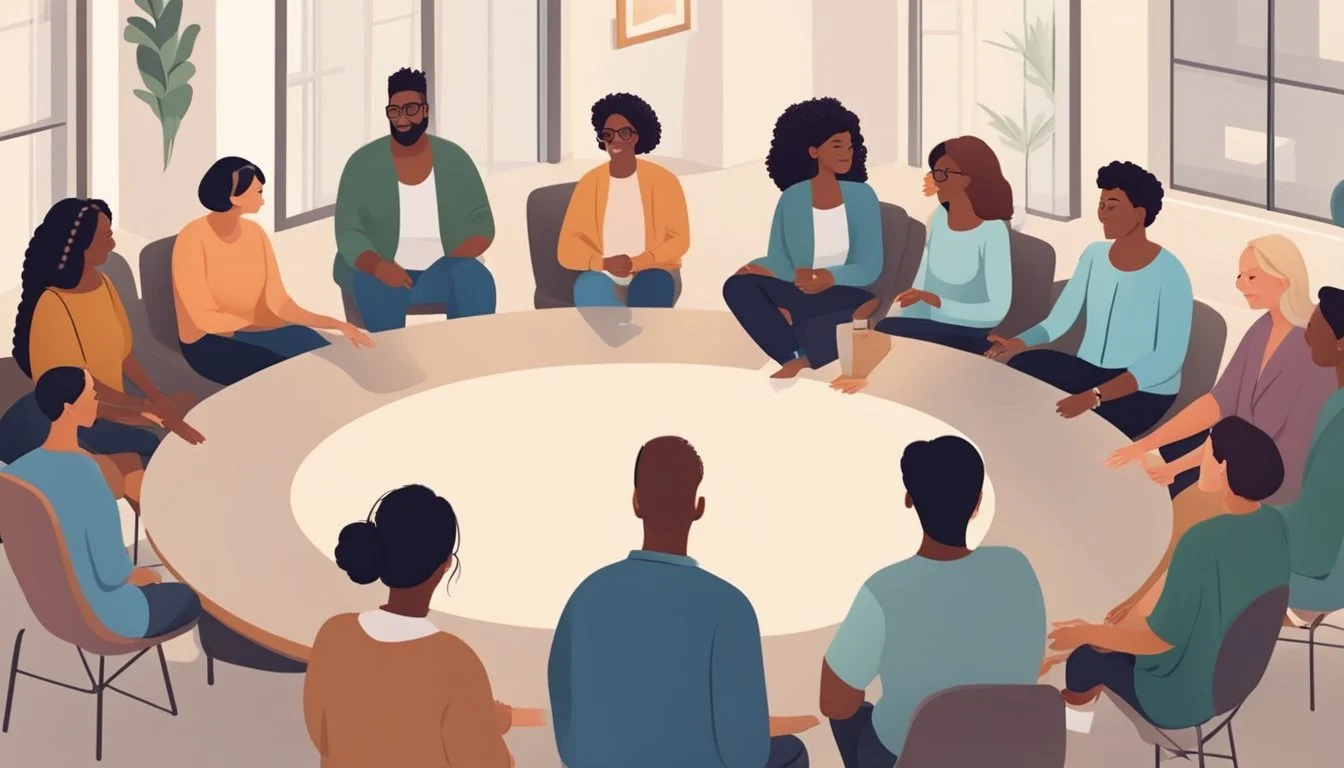10 Ways to Cultivate Healthy Relationships When You Have BPD
Effective Strategies for Emotional Stability
Borderline Personality Disorder (BPD) can present significant challenges in personal relationships. Those with BPD often experience intense emotions and fear of abandonment, which may lead to difficulties maintaining stable connections with others. Despite these obstacles, it is possible to cultivate healthy and fulfilling relationships while living with BPD.
With the right strategies and support, individuals with BPD can develop and sustain positive interpersonal connections. This article explores ten effective ways for people with BPD to nurture healthy relationships. By implementing these techniques, those with BPD can work towards building trust, improving communication, and fostering mutual understanding with their partners, friends, and family members.
1) Practice Mindfulness
Mindfulness is a powerful tool for individuals with Borderline Personality Disorder (BPD) to cultivate healthier relationships. It involves focusing on the present moment without judgment.
By practicing mindfulness, people with BPD can become more aware of their thoughts and emotions. This increased self-awareness helps them respond to situations more calmly and rationally.
Regular mindfulness exercises can reduce impulsivity and emotional reactivity. These are common challenges for those with BPD that often strain relationships.
Mindfulness techniques like deep breathing and body scans can be particularly helpful during moments of intense emotion. They provide a grounding effect, allowing individuals to pause and reflect before acting.
Incorporating mindfulness into daily routines can lead to more stable moods and improved interpersonal interactions. Even brief practice sessions can yield significant benefits over time.
For those with BPD, mindfulness can foster a greater sense of emotional balance and self-regulation. This, in turn, contributes to more positive and fulfilling relationships with others.
2) Establish Clear Boundaries
Setting clear boundaries is essential for individuals with Borderline Personality Disorder (BPD) to cultivate healthy relationships. Boundaries define personal limits and expectations within interactions.
For those with BPD, establishing boundaries can be challenging due to fear of abandonment or rejection. However, clear boundaries protect emotional well-being and foster respect in relationships.
Effective boundaries include communicating needs, desires, and limits openly. This might involve expressing discomfort with certain behaviors or requesting space when feeling overwhelmed.
It's important to be consistent in enforcing boundaries. This helps others understand and respect personal limits, reducing misunderstandings and conflicts.
Learning to say "no" when necessary is a crucial aspect of boundary-setting. It allows individuals with BPD to prioritize their own needs and avoid overextending themselves.
Healthy boundaries also involve recognizing and respecting others' boundaries. This mutual respect strengthens relationships and builds trust between individuals.
3) Seek Therapy Regularly
Consistent therapy is crucial for individuals with Borderline Personality Disorder (BPD) to maintain healthy relationships. Regular sessions provide a safe space to explore emotions and develop coping strategies.
Dialectical Behavior Therapy (DBT) is particularly effective for BPD. It teaches skills like mindfulness, emotion regulation, and interpersonal effectiveness, which are essential for managing symptoms and improving relationships.
Therapy can help identify triggers and patterns in relationships. This awareness allows individuals to respond more effectively to challenging situations, reducing conflicts and misunderstandings.
A therapist can also assist in developing and practicing communication skills. These skills are vital for expressing needs, setting boundaries, and resolving conflicts in a healthy manner.
Regular therapy sessions provide ongoing support and accountability. This consistency helps reinforce positive behaviors and thought patterns over time, leading to more stable and fulfilling relationships.
Therapy can also address underlying issues that may contribute to relationship difficulties. By working through past traumas or unresolved conflicts, individuals with BPD can build a stronger foundation for current and future relationships.
4) Engage in Self-Care Routines
Self-care is crucial for individuals with BPD to maintain healthy relationships. Prioritizing personal needs and boundaries helps create a foundation of emotional stability and resilience.
Regular self-care practices can include physical activities like yoga, swimming, or dancing. These activities energize the body and promote overall well-being.
Simplifying one's schedule is another important aspect of self-care. Focusing on activities and relationships that add value to life can reduce stress and improve mental health.
Individuals with BPD should strive to balance individual time with quality time spent with partners. This balance allows for nurturing personal interests while maintaining strong connections.
It's beneficial to establish a routine of regular check-ins with partners about self-care needs. These needs may evolve over time, so open communication helps couples adapt and grow together.
By practicing self-care, individuals with BPD can develop a positive self-image. This, in turn, contributes to healthier relationships with others and improved overall well-being.
5) Communicate Openly with Partners
Open communication forms the foundation of healthy relationships, especially for individuals with Borderline Personality Disorder (BPD). Expressing thoughts and feelings honestly helps build trust and understanding between partners.
For those with BPD, sharing emotions can feel risky. However, learning to articulate needs and concerns in a calm, non-accusatory manner strengthens connections. Partners appreciate authenticity and the opportunity to offer support.
Active listening plays a crucial role in open communication. Both individuals should practice giving their full attention when the other speaks. This demonstrates respect and fosters a safe environment for sharing.
Setting aside regular time for meaningful conversations allows couples to address issues before they escalate. During these talks, partners can discuss relationship goals, boundaries, and any challenges they face.
Being open about BPD symptoms and triggers helps partners understand and respond appropriately. This transparency reduces misunderstandings and allows for collaborative problem-solving within the relationship.
6) Foster Emotional Awareness
Individuals with BPD can benefit greatly from cultivating emotional awareness. This involves recognizing and understanding their own emotions as they arise.
One effective technique is to practice mindfulness meditation. This allows people to observe their thoughts and feelings without judgment, creating space between emotions and reactions.
Keeping an emotion journal can also be helpful. By recording daily emotional experiences, patterns and triggers may become more apparent over time.
Learning to identify and label emotions accurately is another important skill. This can help reduce the intensity of feelings and make them easier to manage.
Exploring the underlying causes of emotional responses can lead to greater self-understanding. Therapy or self-reflection exercises may aid in uncovering these root causes.
Developing awareness of physical sensations associated with different emotions can provide early warning signs of intense feelings. This allows for earlier intervention and regulation.
By fostering emotional awareness, individuals with BPD can gain more control over their responses and build healthier relationships. It takes practice, but the benefits are well worth the effort.
7) Participate in Group Therapy
Group therapy can be a valuable tool for individuals with Borderline Personality Disorder (BPD) to cultivate healthier relationships. This therapeutic setting provides a supportive environment to practice interpersonal skills and receive feedback from peers and professionals.
In group sessions, participants can learn to navigate conflicts effectively, a crucial skill for maintaining healthy relationships. Through structured activities and discussions, individuals gain insight into their own behaviors and thought patterns.
Group therapy also offers opportunities to develop empathy and understanding for others. By listening to and supporting fellow group members, participants can enhance their ability to form deeper connections outside of therapy.
Engaging in group activities, such as role-playing or sharing personal experiences, can help build confidence in social interactions. These exercises allow individuals to practice new coping strategies and communication techniques in a safe space.
Regular attendance and active participation in group therapy sessions can lead to significant improvements in relationship skills. The consistent practice and support provided by the group setting can help individuals with BPD develop more stable and fulfilling relationships over time.
8) Practice Self-Compassion
Individuals with BPD often struggle with intense self-criticism and negative self-talk. Practicing self-compassion can help counteract these harmful patterns and foster a more balanced relationship with oneself.
Self-compassion involves treating oneself with kindness and understanding, especially during difficult times. It encourages recognizing that imperfections and struggles are part of the human experience.
One way to cultivate self-compassion is through mindfulness meditation. This practice involves focusing on the present moment without judgment, allowing thoughts and feelings to arise and pass without getting caught up in them.
Another helpful technique is using positive self-talk. When faced with challenges or setbacks, individuals can practice reframing their inner dialogue to be more supportive and understanding.
Engaging in self-care activities is also an important aspect of self-compassion. This can include setting gentle boundaries, prioritizing rest, and engaging in activities that bring joy and relaxation.
By consistently practicing self-compassion, individuals with BPD can reduce self-criticism, improve emotional resilience, and develop a healthier relationship with themselves.
9) Educate About BPD Together
Learning about Borderline Personality Disorder (BPD) as a team can strengthen relationships. Partners can research reputable sources and attend educational workshops or support groups together.
This shared learning experience fosters understanding and empathy. It helps both individuals recognize BPD symptoms and triggers, leading to more effective communication and support.
Reading books or articles about BPD together provides opportunities for discussion. Partners can share insights and relate the information to their own experiences.
Consulting with mental health professionals as a couple can offer tailored guidance. They can provide strategies for managing BPD symptoms and improving relationship dynamics.
By educating themselves jointly, couples create a united front against BPD challenges. This collaborative approach reinforces their commitment to growth and mutual support.
10) Develop Healthy Coping Mechanisms
Individuals with BPD can benefit greatly from developing healthy coping mechanisms to manage their emotions and relationships. These strategies help regulate intense feelings and reduce impulsive behaviors.
Practicing mindfulness techniques can be particularly effective. This involves focusing on the present moment without judgment, which can help reduce emotional reactivity.
Deep breathing exercises and progressive muscle relaxation are simple yet powerful tools for managing stress and anxiety. These techniques can be used discreetly in various situations.
Engaging in regular physical exercise releases endorphins and improves mood. Activities like yoga, running, or dancing can serve as positive outlets for intense emotions.
Journaling provides a safe space to express thoughts and feelings. It can help identify patterns in emotions and behaviors, leading to better self-awareness.
Creative pursuits such as art, music, or writing can be therapeutic. These activities offer healthy ways to channel emotions and promote self-expression.
Building a support network of trusted friends, family, or support groups provides valuable emotional support. Sharing experiences with others who understand can be incredibly validating.
Understanding BPD and Its Impact on Relationships
Borderline Personality Disorder (BPD) significantly influences interpersonal dynamics. It affects communication patterns and emotional regulation, presenting unique challenges for individuals with BPD and their partners.
How BPD Affects Communication
People with BPD often experience intense emotions that can lead to misunderstandings. They may struggle with interpreting others' intentions accurately, sometimes perceiving rejection or abandonment where none exists. This can result in rapid mood shifts and reactive behaviors.
Communication may become strained as individuals with BPD alternate between idealization and devaluation of their partners. They might express love and admiration one moment, then criticism and anger the next. This unpredictability can create tension and confusion in relationships.
Using "I" statements can help improve communication. For example: "I feel scared when you're late" instead of "You're always inconsiderate." This approach promotes understanding and reduces blame.
The Role of Emotional Regulation
Emotional dysregulation is a core feature of BPD that impacts relationships. Individuals may experience intense mood swings, making it challenging to maintain stable connections. Their emotions can shift rapidly, often in response to perceived threats or abandonment.
This instability can lead to impulsive actions or self-destructive behaviors that strain relationships. Partners may feel overwhelmed by the intensity of emotions displayed.
Learning coping strategies is crucial. Mindfulness techniques, deep breathing exercises, and grounding methods can help manage emotional intensity. Professional support, such as Dialectical Behavior Therapy (DBT), can teach valuable skills for emotional regulation.
Setting clear boundaries is essential for both partners. This helps create a sense of safety and predictability in the relationship, benefiting both individuals.
Strategies for Building Trust
Building trust is essential for healthy relationships, especially for those with BPD. Two key strategies involve being consistent and reliable, and establishing clear boundaries.
Consistency and Reliability
Consistency forms the foundation of trust in relationships. For individuals with BPD, demonstrating reliability can be particularly impactful. Keeping promises, following through on commitments, and maintaining a steady presence are crucial.
Being punctual for appointments and responding to messages in a timely manner show respect and dependability. It's important to communicate openly about any changes or delays. If unable to fulfill a commitment, explain the situation honestly and make amends.
Consistency extends to emotional responses as well. Striving for emotional stability and predictability can help partners feel more secure. This doesn't mean suppressing emotions, but rather managing them effectively and expressing them in healthy ways.
Setting Boundaries
Clear boundaries are vital for building trust and maintaining healthy relationships. For those with BPD, setting and respecting boundaries can be challenging but is essential for fostering mutual respect and understanding.
Start by identifying personal limits and communicating them clearly to partners. This might include specifying needs for alone time, personal space, or emotional support. Be specific about what is and isn't acceptable in the relationship.
Respect others' boundaries as well. Ask for clarification if unsure about a partner's limits. Avoid pushing boundaries or testing them repeatedly, as this can erode trust. When boundaries are crossed, address the issue calmly and directly.
Boundaries may need adjustment over time. Regular, open discussions about boundaries can help ensure they remain relevant and beneficial to the relationship.





